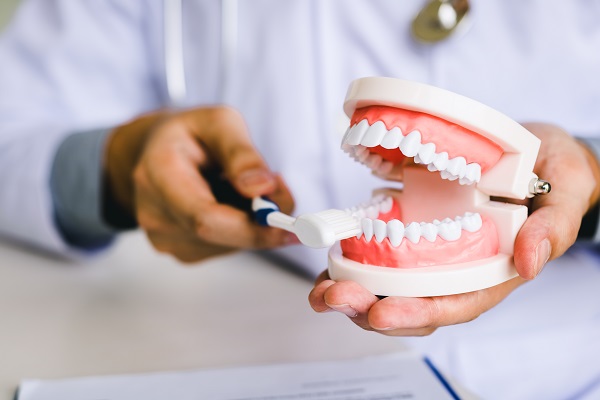Why Proper Dental Hygiene Is Crucial After Dental Implant Surgery

Most people dream of keeping their own healthy teeth for life, but for those who cannot, a dental implant may be the answer. Cavities or infection can take a toll on otherwise strong teeth, and so can accidental impact or breakage. Even a crown may weaken or crack.
Dental implants are giving hope to many who otherwise may be resigned to wearing dentures.
Who is a candidate for a dental implant?
There are just a few crucial criteria that give implants a better chance of being successful. Perhaps most importantly, the jaw must have adequate bone density and depth to support the titanium roots that go below the gums. A mild infection can be treated, but those with periodontal disease are not candidates. Additionally, the general health of the person will be evaluated.
People without heart problems or other issues that would prove dangerous during the process of oral surgery are good candidates for one or more implants.
What is involved in the implant process?
After determining whether someone is a good risk, any teeth that need to be removed are taken care of. Then an incision is made in the gum line and a titanium implant is screwed into the bone itself, replacing the root. A protective covering is put in place while the gums heal.
Next, a series of things happen. The gum is uncovered and an impression of the area and any surrounding teeth is taken. Then a working model is made and tweaked until the fit is accurate. Finally, the crown is seated on the implant.
Proper aftercare
After what can take a couple of months, the implant process is complete, but what comes next is crucial to its success. Maintaining oral health and the integrity of a new dental implant takes a bit of work. Food particles may stick to an artificial material even more than natural teeth, so there are several measures that need to be taken in order to keep the mouth healthy.
Brushing
Brush regularly, at least twice each day, using a non-abrasive toothpaste. Brushing is one of the best ways to keep a new implant clean. Choose an electric, sonic or manual toothbrush, but make sure it has soft bristles.
Flossing
Carefully floss around all teeth, paying special attention to the area around the implant. If floss will not go through, don’t force it. Instead, visit the dentist to see if a problem needs to be corrected. A water flosser is also a good option and can be used with a germ-killing mouth rinse for added protection.
Regular checkups
Maintain at least semi-annual visits to the dentist, going more frequently at the first sign of trouble or concern. The dentist will check for any cracking of the implant or signs of bone loss or infection. They will make recommendations as needed to correct any issues.
Conclusion
A dental implant is a big investment both financially and in time. A person’s appearance and oral health can be greatly improved by undergoing the process. But ultimately, getting the most out of them comes down to making a diligent habit of performing good oral hygiene practices.
Are you considering dental implants in the Gainesville area? Get more information at https://gallodental.com.
Check out what others are saying about our services on Yelp: Read our Yelp reviews.
Recent Posts
Sleep apnea is a serious sleep disorder that affects millions of individuals worldwide. It occurs when breathing repeatedly stops and starts during sleep, disrupting rest and potentially causing long-term health consequences. Many people are unaware that a general dentist plays a key role in diagnosing and managing sleep apnea, particularly with non-invasive treatment solutions. By…
No matter your stage in life, maintaining a healthy smile is important. Regular visits to a family dentist provide comprehensive care for people of all ages, ensuring a lifetime of healthy smiles. These routine check-ups address immediate concerns, can prevent future dental issues, and provide you and your family with the information you need to…
ClearCorrect® is a teeth-straightening system that utilizes clear aligners to move teeth into a more appropriate position. There are many benefits to choosing ClearCorrect treatment. It is helpful to understand exactly what it is, how the treatment process works, and what cosmetic and oral health concerns ClearCorrect fixes.Everyone deserves a beautiful, properly aligned smile that…
Dental anxiety is a common issue that affects people of all ages. This term refers to the fear, anxiety, or stress of dental visits. There are several misconceptions about dental anxiety, leading to additional fear or avoidance of necessary dental care. By separating facts from fiction, patients can better understand this condition and go to…


